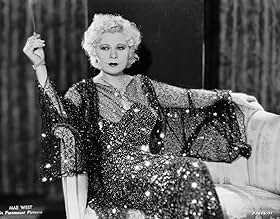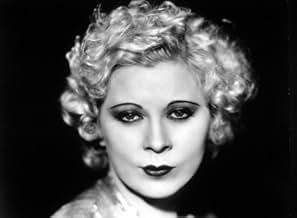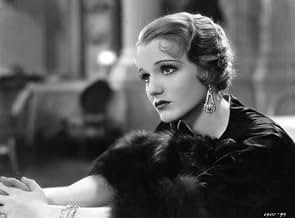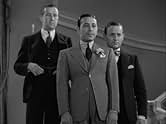IMDb-BEWERTUNG
6,7/10
1309
IHRE BEWERTUNG
Füge eine Handlung in deiner Sprache hinzuA successful ex-boxer opens a high-class speakeasy in what once was the childhood home of a formerly rich society girl.A successful ex-boxer opens a high-class speakeasy in what once was the childhood home of a formerly rich society girl.A successful ex-boxer opens a high-class speakeasy in what once was the childhood home of a formerly rich society girl.
- Auszeichnungen
- 2 wins total
George Templeton
- Patsy
- (as Dink Templeton)
Jay Eaton
- Nightclub Patron
- (Nicht genannt)
Bill Elliott
- Escort
- (Nicht genannt)
Patricia Farley
- Hatcheck Girl
- (Nicht genannt)
Dick Gordon
- Nightclub Patron
- (Nicht genannt)
Theresa Harris
- Ladies' Room Attendant
- (Nicht genannt)
Empfohlene Bewertungen
NIGHT AFTER NIGHT (Paramount, 1932), directed by Archie Mayo, from the play "Single Night" by Louis Bromfield, is a little remembered feature known solely for its movie debut of the legendary Mae West (1892-1980). Although NIGHT AFTER NIGHT focuses mainly on its leading players, George Raft and Constance Cummings, and a little more footage to Roscoe Karns and Alison Skipworth, this average story, set almost entirely in one night at a speakeasy, about a mug owning a nightery wanting to elevate himself into the upper class of high society, actually is more interesting when Mae West dominates the scene.
NIGHT AFTER NIGHT begins with the opening titles super imposed in front of a mansion with the underscoring to "There's No Place Like Home." With the credits still rolling, a brief history about the mansion is told, first seen with a "for sale" sign, followed by a sign reading "home for rent," and finally the last look of another sign "sold at public auction," before the list of cast credits is focuses fading out with the number of the house address of "55." George Raft plays Joe Anton, a former boxer now the proprietor of a mansion converted into a New York City speakeasy (as pictured during the opening credits) who wants to become part of the social class. Because he has become interested in a mysterious but glamorous woman (Constance Cummings) who patrons his place unescorted night after night, he hires Mrs. Mabel Jellyman (Alison Skipworth), a middle- aged schoolteacher, to teach him the proper methods in speaking and the refinements of life. Eventually Joe becomes acquainted with the woman identified as Jerry Healy of Park Avenue who patronizes his place mainly because the speakeasy happens to be the mansion she had lived in years ago. Because of Anton's involvement with "Miss Park Avenue," Iris Dawn (Wynne Gibson), one of his former mistresses becomes insanely jealous, enough to want to confront Joe and Miss Healy with a loaded pistol. Joe, however, gets even more complications when another one of his old flames, Maudie Triplett (Mae West), enters the scene with her vulgarity and broad humor, rousing up his place.
The supporting cast consists of Roscoe Karns as Leo, Joe's close friend and assistant; Louis Calhern as Dick Bolton, appearing only in one scene opposite Cummings; Al Hill as Blainley; Harry Wallace as Jerky; and Tom Kennedy as Tom, the bartender, among others.
Sadly, NIGHT AFTER NIGHT is a long forgotten and often neglected little movie from the Depression era. Best known for playing gangsters, for his initial starring role, Raft's character is only associated with them, particularly gang leader, Frankie Guard (Bradley Page) who wants to buy Joe's establishment.
The story-line is slight, in fact, enough to stretch it to the 70 minute mark, with few of those minutes going to the fourth billed Mae West as Maudie. West fans would have to sit through more than a half hour devoted to other actors before making her classic entrance, first outside the speakeasy surrounded by men, followed by her walk to the coat check room where the attendant looks over her jewelry and says, "Goodness! what beautiful diamonds." West: "Goodness had nothing to do with it, dearie." With this line, and some others that were to follow, written especially by Mae West herself, a new star is born.
Essentially, this is a light drama with a touch of comedy, compliments of the wit and wisdom of Mae West, NIGHT AFTER NIGHT is one of those rare cases where two tough babes become essential in the story instead of the standard one, but it is West who's character is the most original and natural of the two. While debut films of future major stars are seldom promising, with this one being no exception, NIGHT AFTER NIGHT has become the one and only movie in which West would play a supporting role. Unlike latter West comedies, NIGHT AFTER NIGHT does not take time out for a song or two, but the use of popular tunes of the day, many introduced in other Paramount 1932 productions, including "Everyone Says I Love You," "Mimi," "Isn't It Romantic," "You Little So and So," and "Love Me Tonight" as underscoring during the nightclub sequences.
Although it was Raft who reportedly encouraged West to accept this minor supporting role, he probably never imagined that she's steal the show. In spite of NIGHT AFTER NIGHT being the film that launched George Raft career as a leading man, basically established Mae West into a box office attraction. For Raft, maybe she done him wrong.
Another unfortunate thing about NIGHT AFTER NIGHT is that because it essentially belongs to Raft and Cummings, it hardly ever became part of commercial television's Mae West festival back in the 1960s and 70s. In fact, this was and still is the least known and revived of her movies, even when given a rare cable television broadcast on Turner Classic Movies (TCM premiere: August 24, 2016). Prior to that, MCA Home Video distributed NIGHT AFTER NIGHT as part of the Mae West centennial package in 1992, releasing all her Paramount movies of the 1930s, including the neglected NIGHT AFTER NIGHT. The legend of Mae West has dimmed some over the years, but once watching any of her movies, even the one that offers little of her presence as NIGHT AFTER NIGHT, it would become apparent that she was something special. Goodness probably had nothing to do with it, but talent and her dialog delivery sure does. (***)
NIGHT AFTER NIGHT begins with the opening titles super imposed in front of a mansion with the underscoring to "There's No Place Like Home." With the credits still rolling, a brief history about the mansion is told, first seen with a "for sale" sign, followed by a sign reading "home for rent," and finally the last look of another sign "sold at public auction," before the list of cast credits is focuses fading out with the number of the house address of "55." George Raft plays Joe Anton, a former boxer now the proprietor of a mansion converted into a New York City speakeasy (as pictured during the opening credits) who wants to become part of the social class. Because he has become interested in a mysterious but glamorous woman (Constance Cummings) who patrons his place unescorted night after night, he hires Mrs. Mabel Jellyman (Alison Skipworth), a middle- aged schoolteacher, to teach him the proper methods in speaking and the refinements of life. Eventually Joe becomes acquainted with the woman identified as Jerry Healy of Park Avenue who patronizes his place mainly because the speakeasy happens to be the mansion she had lived in years ago. Because of Anton's involvement with "Miss Park Avenue," Iris Dawn (Wynne Gibson), one of his former mistresses becomes insanely jealous, enough to want to confront Joe and Miss Healy with a loaded pistol. Joe, however, gets even more complications when another one of his old flames, Maudie Triplett (Mae West), enters the scene with her vulgarity and broad humor, rousing up his place.
The supporting cast consists of Roscoe Karns as Leo, Joe's close friend and assistant; Louis Calhern as Dick Bolton, appearing only in one scene opposite Cummings; Al Hill as Blainley; Harry Wallace as Jerky; and Tom Kennedy as Tom, the bartender, among others.
Sadly, NIGHT AFTER NIGHT is a long forgotten and often neglected little movie from the Depression era. Best known for playing gangsters, for his initial starring role, Raft's character is only associated with them, particularly gang leader, Frankie Guard (Bradley Page) who wants to buy Joe's establishment.
The story-line is slight, in fact, enough to stretch it to the 70 minute mark, with few of those minutes going to the fourth billed Mae West as Maudie. West fans would have to sit through more than a half hour devoted to other actors before making her classic entrance, first outside the speakeasy surrounded by men, followed by her walk to the coat check room where the attendant looks over her jewelry and says, "Goodness! what beautiful diamonds." West: "Goodness had nothing to do with it, dearie." With this line, and some others that were to follow, written especially by Mae West herself, a new star is born.
Essentially, this is a light drama with a touch of comedy, compliments of the wit and wisdom of Mae West, NIGHT AFTER NIGHT is one of those rare cases where two tough babes become essential in the story instead of the standard one, but it is West who's character is the most original and natural of the two. While debut films of future major stars are seldom promising, with this one being no exception, NIGHT AFTER NIGHT has become the one and only movie in which West would play a supporting role. Unlike latter West comedies, NIGHT AFTER NIGHT does not take time out for a song or two, but the use of popular tunes of the day, many introduced in other Paramount 1932 productions, including "Everyone Says I Love You," "Mimi," "Isn't It Romantic," "You Little So and So," and "Love Me Tonight" as underscoring during the nightclub sequences.
Although it was Raft who reportedly encouraged West to accept this minor supporting role, he probably never imagined that she's steal the show. In spite of NIGHT AFTER NIGHT being the film that launched George Raft career as a leading man, basically established Mae West into a box office attraction. For Raft, maybe she done him wrong.
Another unfortunate thing about NIGHT AFTER NIGHT is that because it essentially belongs to Raft and Cummings, it hardly ever became part of commercial television's Mae West festival back in the 1960s and 70s. In fact, this was and still is the least known and revived of her movies, even when given a rare cable television broadcast on Turner Classic Movies (TCM premiere: August 24, 2016). Prior to that, MCA Home Video distributed NIGHT AFTER NIGHT as part of the Mae West centennial package in 1992, releasing all her Paramount movies of the 1930s, including the neglected NIGHT AFTER NIGHT. The legend of Mae West has dimmed some over the years, but once watching any of her movies, even the one that offers little of her presence as NIGHT AFTER NIGHT, it would become apparent that she was something special. Goodness probably had nothing to do with it, but talent and her dialog delivery sure does. (***)
Night After Night is a very amusing gangster spoof comedy from the early talkie era. Best remembered as Gorge Raft's first starring role and Mae West's introductory movie role -- as if she needed any introduction! Nevertheless, this unambitious little movie stands on its own, tightly directed by Archie Mayo, beautifully filmed by cinematographer Ernest Haller, and well acted by the entire cast. The dialog is snappy with lots of funny lines, and the musical score, which seems to be that naturally produced by the bands in the speakeasy setting, stays in the background but enhances the light-hearted, devil-may-care Prohibition ambiance. Released in late 1932, this picture looks and sounds very sophisticated technically, showing in what a short time the industry had overcome the problems of creaky early sound equipment.
Raft, the owner of a high-class speak, is admiring from afar, and in fact has rather foolishly fallen in love with, a classy-looking "Park Avenue dame" (Constance Cummings) who frequents his joint, sitting all by herself and looking dreamy. Because he knows he's a no-class mug, he hires a stuffy old school teacher (Alison Skipworth) to teach him how to get some -- class, that is. It's a hopeless case of course, but Raft manages to get a date with the swell broad anyway, mainly because the building his joint occupies was once her girlhood home. The brew is stirred by a rival gang trying to horn in on his operation, a pistol-packing, madly jealous ex-moll (Wynne Gibson), and Raft's cynical henchman (Roscoe Karns) grousing about the entire proceeding. Raft thinks he has it going swimmingly with the swell dame when he gets her to dinner at his joint, especially since he has his tutor Skipworth at the table to give him moral support and keep his shaky class from slipping. The party gets livelier when it is crashed by another of his old flames, that moll of molls Mae West. The inimitable Mae works her very bad influence to get the school teacher roaring drunk.
Those to whom this is the first Mae West movie, may wonder why there was so much fuss over her. Sure, her two best assets -- the ones the inflatable life preserver was named for -- look great in a see-though negligee, but she's still a chubby middle-aged woman. Well, stick around. She would have probably said something like, "It ain't what ya got, it's how you carry it." Mae's role here is a supporting one. She doesn't show up until the midway point and has only a couple of scenes, but as George Raft reportedly complained, "She stole everything but the cameras!" Raft and Cummings are okay in the leads, both charming in fact. But it is the supporting cast that shines in this little jewel. Mae West is Mae West, and Roscoe Karns is Roscoe Karns at his best. Yet Alison Skipworth as the stuffy but lovable old schoolmarm practically steals the show, as she did nearly every movie she was in. She even keeps up with Mae West in the scene-stealing game. Here's a hot tip for you little mugs and mollies who are new to the racket of watching beautiful, old black and white movies -- you can't go wrong if you make a point to never miss an Alison Skipworth picture!
Night After Night is slick, solid, Old Hollywood entertainment all the way.
Raft, the owner of a high-class speak, is admiring from afar, and in fact has rather foolishly fallen in love with, a classy-looking "Park Avenue dame" (Constance Cummings) who frequents his joint, sitting all by herself and looking dreamy. Because he knows he's a no-class mug, he hires a stuffy old school teacher (Alison Skipworth) to teach him how to get some -- class, that is. It's a hopeless case of course, but Raft manages to get a date with the swell broad anyway, mainly because the building his joint occupies was once her girlhood home. The brew is stirred by a rival gang trying to horn in on his operation, a pistol-packing, madly jealous ex-moll (Wynne Gibson), and Raft's cynical henchman (Roscoe Karns) grousing about the entire proceeding. Raft thinks he has it going swimmingly with the swell dame when he gets her to dinner at his joint, especially since he has his tutor Skipworth at the table to give him moral support and keep his shaky class from slipping. The party gets livelier when it is crashed by another of his old flames, that moll of molls Mae West. The inimitable Mae works her very bad influence to get the school teacher roaring drunk.
Those to whom this is the first Mae West movie, may wonder why there was so much fuss over her. Sure, her two best assets -- the ones the inflatable life preserver was named for -- look great in a see-though negligee, but she's still a chubby middle-aged woman. Well, stick around. She would have probably said something like, "It ain't what ya got, it's how you carry it." Mae's role here is a supporting one. She doesn't show up until the midway point and has only a couple of scenes, but as George Raft reportedly complained, "She stole everything but the cameras!" Raft and Cummings are okay in the leads, both charming in fact. But it is the supporting cast that shines in this little jewel. Mae West is Mae West, and Roscoe Karns is Roscoe Karns at his best. Yet Alison Skipworth as the stuffy but lovable old schoolmarm practically steals the show, as she did nearly every movie she was in. She even keeps up with Mae West in the scene-stealing game. Here's a hot tip for you little mugs and mollies who are new to the racket of watching beautiful, old black and white movies -- you can't go wrong if you make a point to never miss an Alison Skipworth picture!
Night After Night is slick, solid, Old Hollywood entertainment all the way.
In particular this is a great showcase for George Raft in his first leading role and Mae West in her first film role. Raft plays Joe Anton, a bootlegger who buys a mansion at a foreclosure auction and turns it into a speakeasy. Anton wants what he thinks the Park Avenue crowd has now that he has the money - class. He employs Mabel Jellyman (Alison Skipworth) to tutor him properly in elocution and current events. But Anton has other troubles with his current life as a gangster besides not knowing what fork to use. Rival gangsters are demanding that he sell out to them or they will rub him out. He has two old girlfriends that keep showing up unannounced too - Maudie (Mae West) is easy going about things, but Iris (Wynne Gibson) is demanding to the point of being violent that their old relationship continue. Matters get really complicated when "a real lady" shows up alone night after night at Joe's speakeasy. She's not looking for a pickup, in fact she shuns advances of any kind. It turns out she's the destitute ex-resident of Joe's mansion who misses her old house and her old life.
If you're looking for a really clever tight script, that doesn't seem to be the purpose of this film. It's just one of Paramount's sophisticated pre-codes with lots of little scenes that make the whole thing worthwhile. The scene with a hung-over Alison Skipworth getting a job offer from Mae West with Skipworth trying to tactfully figure out exactly what business Mae is in is priceless - Skipworth can't help but notice that Maudie (Mae West) is covered in diamonds with no visible means of support. There's been lots of speculation about the nature of the relationship between Joe and his man Friday Leo (Roscoe Karnes) given the rather revealing bath scene the two men are in, but I think that was just an opportunity for a little precode male beefcake.
Highly recommended as one of a very few of the Paramount precodes actually on DVD.
If you're looking for a really clever tight script, that doesn't seem to be the purpose of this film. It's just one of Paramount's sophisticated pre-codes with lots of little scenes that make the whole thing worthwhile. The scene with a hung-over Alison Skipworth getting a job offer from Mae West with Skipworth trying to tactfully figure out exactly what business Mae is in is priceless - Skipworth can't help but notice that Maudie (Mae West) is covered in diamonds with no visible means of support. There's been lots of speculation about the nature of the relationship between Joe and his man Friday Leo (Roscoe Karnes) given the rather revealing bath scene the two men are in, but I think that was just an opportunity for a little precode male beefcake.
Highly recommended as one of a very few of the Paramount precodes actually on DVD.
I'm sorry, but I do not understand most of the reviews here taking so much time on Mae West (not my aunt). This was the first movie in which I was aware of Constance Cummings, and for me, she makes it. Mae West is an amusing diversion, a counterpoint to the core story, but it is not her movie. Constance Cummings is both gorgeous and icily, mysteriously seductive. In every one of her scenes. she fascinates and dominates.
Yes, it's fun to hear the first iteration of Mae's "goodness had nothing to do with it", and yes, the ending is simplistic and abrupt, but it was the Cummings character that kept me watching.
Yes, it's fun to hear the first iteration of Mae's "goodness had nothing to do with it", and yes, the ending is simplistic and abrupt, but it was the Cummings character that kept me watching.
Although this film is will always be remembered for introducing Mae West to cinema audiences it is actually a starring vehicle for George Raft. He had made quite an impact in 'Scarface' and here he is top billed for the first time. The studio really wanted him to be a 'Valentino' type and he certainly looks the part in this film. He's the snappiest dresser you ever did see and there's a lot of heavy makeup on his face to accentuate his smouldering good looks. He even gets to take a bath and it's quite obvious he's naked for the scene - it's all geared up to make the ladies in the audience come over all unnecessary! Unfortunately for George he suggested Mae West for a small role in the film and when she appears she hits it like a whirlwind. It's a pretty slow movie and when Mae arrives she knocks it for six with her quick-fire delivery and outrageous behaviour. She may be fat and nearly forty but she is a wow and for those people who suggest she may have been a man in drag just take a look at her in her negligee and you'll see it's quite clear she's all woman!There's not much in the way of a plot, the art direction is nothing to write home about and there's nothing innovative in the way of camera work but it's worth watching to see these two sexy, classic stars make their mark in Hollywood history. If you want to see how they ended up then you should watch 'Sextette' made forty six years later but I don't think I'd recommend it! Enjoy them in their prime!
Wusstest du schon
- WissenswertesIn the famous scene in which the hat-check girl exclaims over Maudie's (Mae West) jewels, "Goodness, what beautiful diamonds," and Maudie replies, "Goodness had nothing to do with it, Dearie", the diamonds were real and belonged to West.
- PatzerA shadow of the boom microphone is visible to the upper left of the front door of the speakeasy when Maudie first arrives.
- Zitate
Hatcheck girl: Goodness, what beautiful diamonds!
Maudie: Goodness had nothing to do with it, dearie.
- VerbindungenFeatured in Hollywood: The Gift of Laughter (1982)
- SoundtracksEveryone Says I Love You
(uncredited)
Music by Bert Kalmar
Played at the speakeasy when Joe makes the rounds and first spots Jerry
Also played at the end
Top-Auswahl
Melde dich zum Bewerten an und greife auf die Watchlist für personalisierte Empfehlungen zu.
- How long is Night After Night?Powered by Alexa
Details
- Erscheinungsdatum
- Herkunftsland
- Sprache
- Auch bekannt als
- Natt efter natt
- Drehorte
- Produktionsfirma
- Weitere beteiligte Unternehmen bei IMDbPro anzeigen
- Laufzeit1 Stunde 13 Minuten
- Farbe
- Seitenverhältnis
- 1.37 : 1
Zu dieser Seite beitragen
Bearbeitung vorschlagen oder fehlenden Inhalt hinzufügen




































